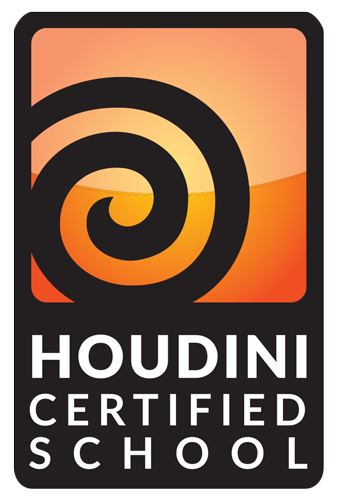


This innovative, online Houdini program teaches students with no experience in CG how to develop complex VFX sequences. With a specific focus on Houdini software, graduates from this program step into the industry with an elevated insight into one of most in-demand tools.
This program includes courses for 3D animation and VFX sequences with a specific focus on Houdini software for aspiring CG artists. Taught through Think Tank’s interactive platform, Portal, this program combines prerecorded tutorials, collaborative workshops, and one-on-one mentorship to prepare students for a career in Film, TV, or Games.
Harnessing the power of Houdini, you’ll master the software’s advanced procedural workflow to create elevated animations, VFX sequences, and 3D assets for games. Specializing in your field of interest, you will create a portfolio that is catered toward a particular career, and often, a specific studio.
As a true benchmark in 3D and VFX software, your ability to both comprehend and integrate Houdini into a pipeline for Film or Games immediately elevates not only your work, but your value to a project.
This program is for artists new to CG who seek a comprehensive education with a focus on Houdini. Students must be ready to dedicate at least 40-60 hours a week to their studies. Working while studying is not recommended.
While developing a broad skillset that enables you to pursue a variety of career paths, you’ll have the opportunity to focus on a unique specialization that’ll help define you as a CG Artist.
Start with the basics. From a brief history of VFX to texturing, lighting, compositing, rendering, asset creation and more…this term is designed to train you in the most essential facets of 3D Modeling. Alongside a concentration on Houdini, you’ll be introduced to the other important software tools you’ll use when working in the industry.
The courses you’ll take in this term will emphasize and enhance your organization, flexible thinking and problem solving skills. In just 16 weeks, you’ll become an extremely well-rounded artist, with a strong inkling towards the area of CG you might specialize in.

The fundamental courses started in Term 1 continue, becoming more intense, complex, and demanding. You’ll be presented with more in-depth, creative techniques and tools which will allow you to produce more complex and detail-oriented work.
As you move through Term 2, you’ll start to build on you skills in Houdini and really start to grasp the revolutionary workflows and procedures that the software offers. From here, you’ll produce your Intermediate Final Project – producing an environment, a creature or character, or another type of asset for Film or Games.

Courses in this term focus on advanced Houdini tools, uses and methods that will prepare you for the final stages of your specialization. Upon being connected with your personal mentor, you’ll begin to develop a full-term final project that will serve as a high-quality asset preceding the portfolio production stage to come.
You’ll be required to maintain a full production schedule under the guidance of your supervisor while advanced stream courses continue. By the end of the term, you will have a robust understanding of Houdini's advanced capabilities and be well-equipped to tackle your portfolio.

As the foundational piece of the portfolio production process, this mentor-focused term has you making definitive creative decisions–such as finalizing shots, completing lighting, rendering, and compositing to produce what will become the final cut.
Alongside the advice of your supervisor and mentor, you’ll take lessons focusing on presentation skills, portfolio packaging, career preparation and job search which will provide invaluable direction on preparing resumés and cover letters, as well as industry practices and ethics.

• Live Q&A - Your questions answered.
• Houdini? - CFX, Procedural Modeling + more!
• Career Insights - Where Think Tank grads are now.
• Mystery Giveaway! - Stick around until the end!
Get your questions answered and take the next step in your creative future.
Presented By:



Our proprietary platform is your home base. Connect with students, your supervisor, take in live sessions and get feedback.
Mastering Houdini puts you in the driver’s seat of one of the most exciting and versatile softwares in CG.
Utilize training materials, such as video, software screen capture, exercises, resources, and assignments.
Each class has a max of eight students. This means less theory, less waiting, more collaboration, and more feedback.
Take part in live question-and-answer sessions with your classmates and supervisor to share your ideas.
Gain the skills, confidence, connections, and portfolio required to make a statement and land that first job.
